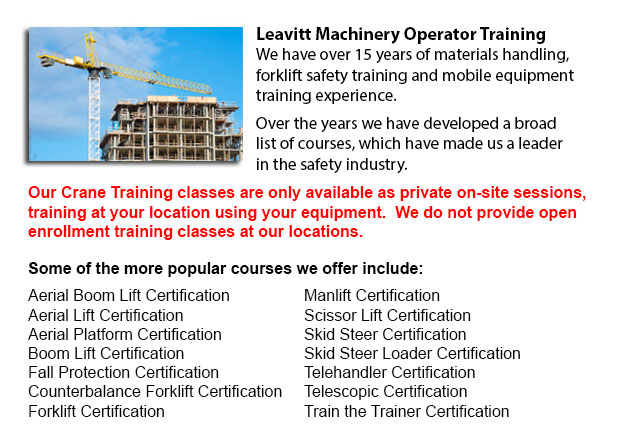
Crane Training Courses Penticton - The heavy machinery crane is utilized to be able to lower, move and lift heavy stuff. Usually, the crane comes equipped along with a hoist, sheaves, and chains or wire ropes. Cranes are used in the industries of construction, transport and manufacturing. These machines truly help with the unloading and loading of freight, moving things, and heavy equipment assembly.
Cranes are available in various types. Each type of crane is utilized for a specific use. Jib cranes are the smallest type, meant for indoor use. The tallest type is the Tower crane, used for constructing buildings. Mini-cranes are utilized to access tight spaces. Floating cranes are utilized oil rig construction and salvaging operations on water.
In the crane training course session, daily crane operating procedures will be reviewed. Course content covers the implementation of proper overhead material handling measures. Right training means less maintenance expenses and longer equipment lifespan. The course instructs participants in operating and inspection methods focused on all factors of operation, such as right rigging and slinging. Participants will be able to deal with critical crane parts to know the mechanical parts. Lifting practices would be demonstrated together with recommended methods for review by your safety committee. Sessions will include demonstration videos. The crane training course comprises a resource and reference manual.
Course content consists of codes regarding overhead cranes; machine terms, correct inspection ways; hoists and attachments; essential maintenance requirements and procedures; right sling use.
The types of machines which will be covered, comprises: All Types of Slings; All Kinds of Below-the-Hook Devices; Lever Hoists Hand Chain Hoists; Wire Rope and Electric Chain Hoists; Light railed and patented cranes; Jib Cranes; Standard overhead Cranes; Cab Operated Cranes; Magnet Functions; Radio Controlled Functions and Hot Metal Applications.
You could inquire regarding our customized training courses, like for example electric chain hoists for theatres; rigging training for a refresher, bilingual training in hazardous surroundings; high lifts; jib, gantry and pedestal cranes.
-
Forklift Certification Schools Penticton
Forklift Certification Schools Penticton - In North America, forklift certification is mandatory, making forklift training programs essential for both the business and their employees working as operators of forklifts. Forklift training focuses on sa... More -
Telehandler Training Courses Penticton
Telehandler Training Courses Penticton - The employer has the responsibility to make sure that their personnel are trained to work proficiently utilizing telehandler machinery. The workers have to be assessed for their ability to utilize the machine.... More -
Certified Fall Protection Training in Penticton
There are many injuries at work linked to falling and lots of fall-related deaths reported each and every year. Most of these instances might have been prevented with better training, better precautions in place, and by properly equipping employees b... More -
Zoom Boom Training Penticton
Zoom Boom Training Penticton - Zoom Boom Training is designed to train operators on variable reach forklifts. The objectives of the training are to impart an understanding of the physics of the machine, and to outline the operator's job. This course... More -
Crane Training Schools Penticton
Crane Training Schools Penticton - We have designed various Mobile Crane Operation programs at our Crane Training Schools. These programs are recommended for the experienced operator who needs re-certification or certification, and for inexperienced... More -
Aerial Lift, Boom Lift, Man Lift, Scissor Lift Training in Penticton
Lift tables or also referred to as scissor hoists can lift up both individuals and materials vertically. They are normally utilized in industrial, construction and commercial environments. Normally, the use of a scissor forklift is to lift and lower... More -
Forklift Training Program Penticton
Forklift Training Program Penticton - The forklift is a common powered industrial vehicle which is in wide use nowadays. They are occasionally known as hi los, lift trucks or jitneys. A departments store will utilize the forklift to unload and load m... More -
Overhead Crane Training Penticton
Overhead Crane Training Penticton - An overhead crane is a large crane used to move and lift huge, heavy objects that cannot be lifted by hand. An overhead crane is normally fixed in position while in use. These machines are capable of moving huge vo... More

Forklift Training Penticton
TOLL FREE: 1-888-254-6157
Penticton, British Columbia
forklifttrainingpenticton.com
Email Us
About Us


